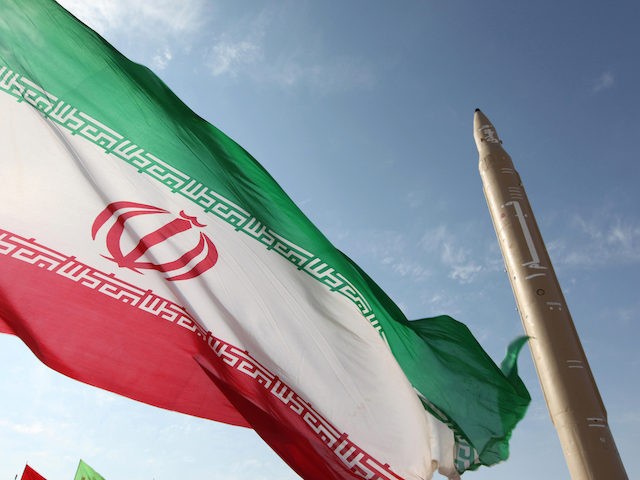Deputy Secretary of State Wendy Sherman said on Wednesday there has been “a lot of progress made” on bringing the United States back into the Iran nuclear deal, allowing formal negotiations with Iran to resume this weekend.
“I think there’s been a lot of progress made, but out of my own experience, until the last detail is nailed down, and I mean nailed down, we will not know if we have an agreement,” Sherman said at a virtual event organized by the German Marshall Fund, a trans-Atlantic think tank.
Sherman’s optimism was somewhat discordant with recent news, which has been all about the International Atomic Energy Agency (IAEA) losing patience with Tehran’s wanton violations of the nuclear deal, formally known as the Joint Comprehensive Plan of Action (JCPOA).
Her remarks were also somewhat out of step with the latest comments from Secretary of State Antony Blinken, who said it was “unclear whether Iran is willing and prepared to do what it needs to do to come back into compliance” in remarks to Congress this week, restating a talking point he has been giving for the past month.
“Iran, I think, knows what it needs to do to come back into compliance on the nuclear side, and what we haven’t yet seen is whether Iran is ready and willing to make a decision to do what it has to do. That’s the test and we don’t yet have an answer,” Blinken said at greater length in a late May interview.
IAEA Director-General Rafael Grossi complained on Monday that Iran stubbornly refuses to answer questions about uranium particles discovered at undeclared nuclear sites, despite years of persistent questioning.
“I am deeply concerned that nuclear material has been present at the three undeclared locations in Iran and that the current locations of this nuclear material are not known by the agency,” Grossi declared. He castigated Tehran for talking about cooperation without providing any.
Grossi said it was “becoming increasingly difficult” for him to see how another temporary inspections-extension deal could be offered to the Iranian government – which formally suspended IAEA inspections in February, but made temporary arrangements to allow inspections to continue so European powers would not feel pressured to abandon the JCPOA.
“We cannot limit and continue to curtail the ability of the inspectors to inspect and at the same time pretend that there is trust,” Grossi said, although the Biden administration seems intent on doing exactly that.
The administration made a statement to the IAEA board of governors on Tuesday that “strongly encouraged” Iran to “avoid any action” that would obstruct inspectors from the U.N. nuclear watchdog, suggesting that Tehran’s actions “at a minimum” risk “seriously complicating ongoing efforts to reach an understanding on how Iran can return to compliance with its JCPOA commitments in return for a similar U.S. resumption.” It is difficult to imagine a more mild and conditional rebuke for Iran’s intransigence.
Completely unfazed by the weak prodding from the Biden administration, Iran responded to Grossi by smearing and threatening the IAEA.
“The agency’s report is not credible because it’s not based on reliable sources. It’s also not convincing, because it doesn’t reflect all the dimensions of cooperation and yielded progress,” Iranian envoy Kazm Gharibabadi said, warning that further criticism from the IAEA could make its operations in Iran even more difficult.
In a similar vein, when Blinken said it was “unclear” if Iran was ready to make a deal with the United States in May. Iranian Foreign Minister Mohammad Javad Zarif rhetorically slapped Blinken in the face and restated Iran’s demand that the Biden administration must unconditionally remove all sanctions against Iran before negotiations can proceed any further.
“Lifting Trump’s sanctions, Secretary Blinken, is a legal and moral obligation, NOT negotiating leverage. Didn’t work for Trump – won’t work for you. Release the Iranian people’s billions held hostage abroad due to U.S. bullying. Trump’s legacy is past its expiration date. Drop it, President Biden,” Zarif sneered at Blinken and President Joe Biden.
No evidence exists for the “progress” Sherman talked about on Wednesday, as both the Biden administration and the Iranian regime are saying exactly the same things they have said for months.
Blinken has fretted about Iran “galloping forward” toward nuclear weapons and said its “breakout time” to begin producing nuclear warheads might soon be “down to a matter of weeks,” mooting the nominal purpose of the JCPOA – although it could remain politically useful as an instrument of the Biden team’s desire to reorient Middle Eastern policy toward Iran.
To that end, both Sherman and Blinken have said Iran’s impending presidential election will have an impact on the U.S. negotiating position. The election is scheduled for June 18, and it is highly likely that a hardline theocrat – most likely potential future ayatollah Ebrahim Raesi – will replace outgoing “moderate” Hassan Rouhani, who oversaw Iran’s entry into the JCPOA.
Some Iranian and European envoys who spoke with Reuters on Tuesday thought it was possible a meaningful deal could be struck during the sixth round of negotiations set to begin this weekend, but others thought it would take much more time to reach an understanding on “core issues” and “sequencing,” meaning who makes what concession first. Notably, the Iranian envoys quoted in the article all repeated Zarif’s position that Biden must unilaterally lift all U.S. sanctions before Iran will consider making any concessions.
The more pessimistic envoys noted that no matter who wins the Iranian presidential election, the final authority will rest with Supreme Leader Ayatollah Ali Khamenei or his successor, if the perpetually ailing Khamenei dies or retires. Some analysts predict Iran could become more willing to make concessions if the curmudgeonly Khamenei is no longer Supreme Leader, although it should be noted Raesi is not a fan of the JCPOA.

COMMENTS
Please let us know if you're having issues with commenting.